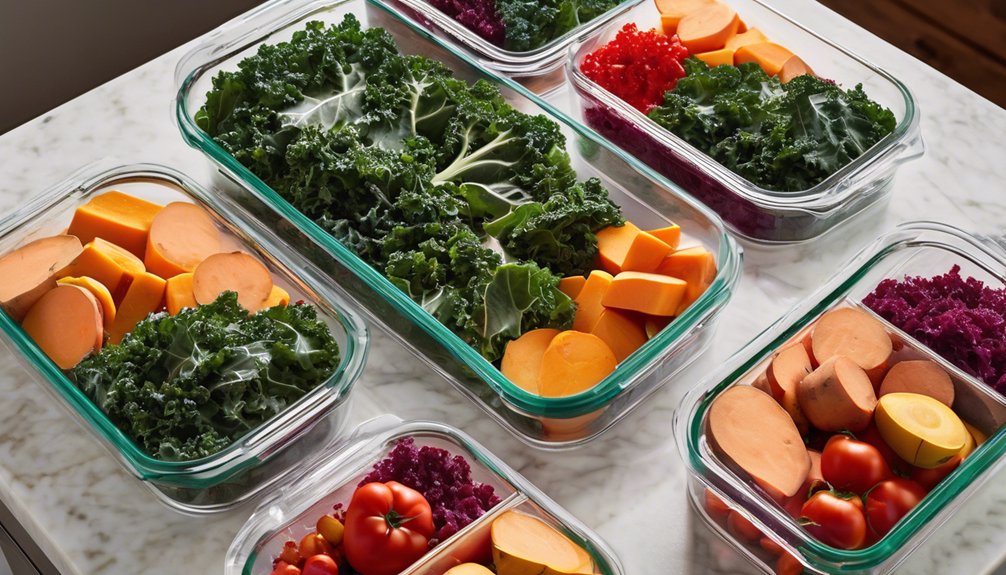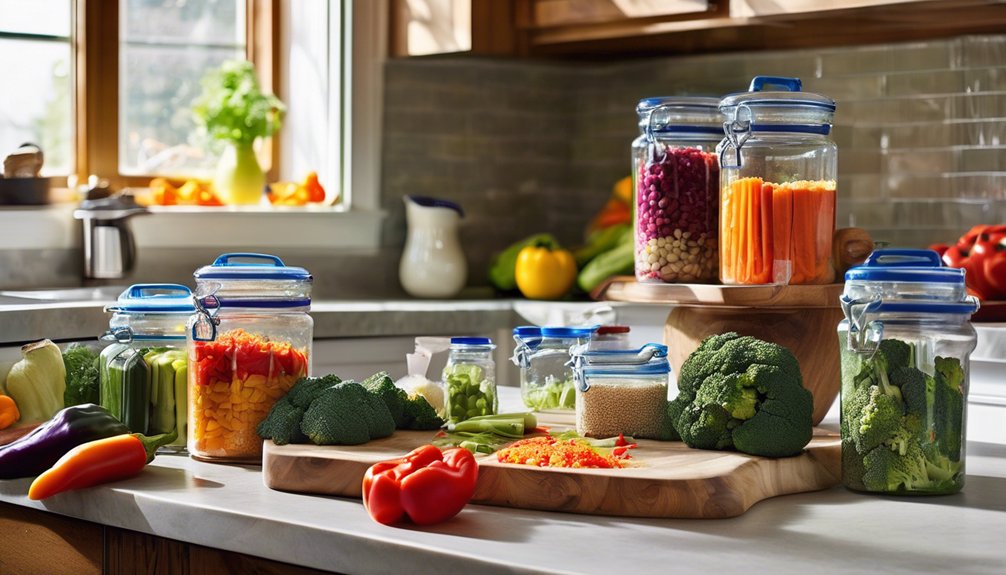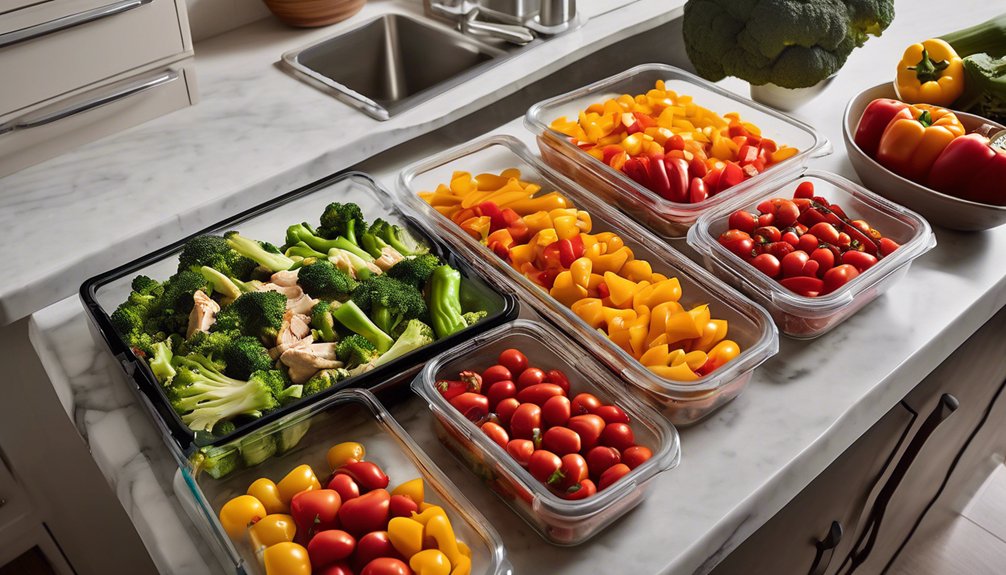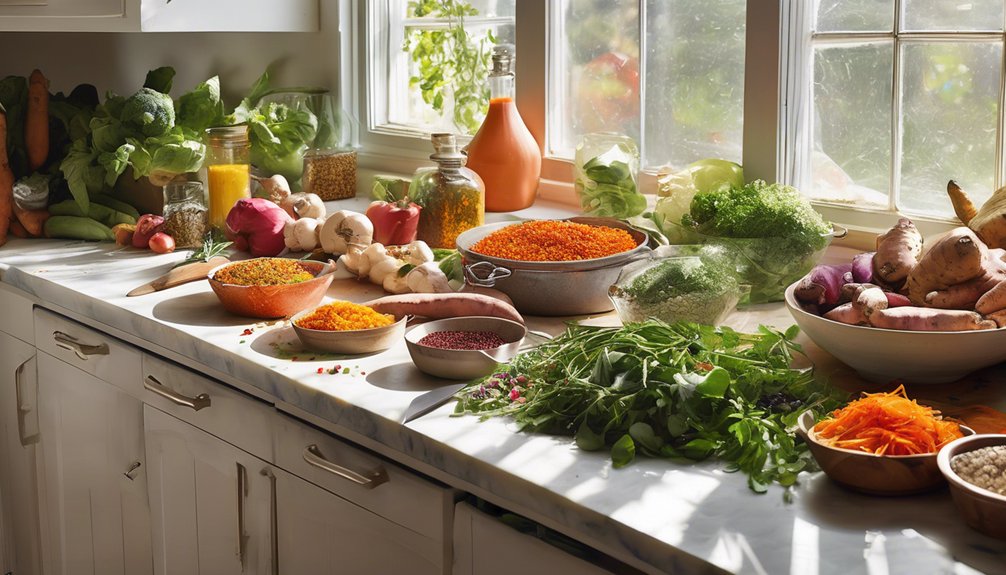Meal Prep for Healthy Eating
You might find it interesting that meal prep can significantly influence your health, just like a well-balanced diet. By preparing your meals ahead of time, you can make better food choices and save time during your busy week. This approach helps you avoid unhealthy last-minute decisions. If you're curious about how to get started and what tools you'll need, there's more to uncover.
Key Takeaways
- Meal prep saves time and promotes healthier eating by reducing last-minute unhealthy food choices.
- Planning a diverse weekly menu helps ensure nutritional balance and variety in meals.
- Batch cooking allows you to prepare large quantities, making healthy meals easily accessible throughout the week.
- Using high-quality containers ensures meal freshness and simplifies storage and reheating.
- Incorporating seasonal ingredients enhances both the taste and nutritional value of meals prepared in advance.
Understanding the Benefits of Meal Prep
When you embrace meal prep, you're not just saving time—you're also setting yourself up for healthier eating habits. By planning your meals in advance, you gain control over your nutritional balance, ensuring you incorporate a variety of food groups.
This proactive approach helps you avoid last-minute unhealthy choices when hunger strikes. Effective time management becomes a natural byproduct; you'll find that cooking in batches not only reduces daily stress but also allows you to enjoy meals you genuinely love.
Research shows that those who meal prep are more likely to stick to their dietary goals. You'll feel empowered, knowing you've invested in your health while simplifying your life. Embrace this practice, and watch how it transforms your relationship with food.
Getting Started With Meal Prep
How do you begin your journey into meal prep? Start with the meal prep basics. First, plan your meals for the week. Choose recipes that are nutritious and easy to prepare. Next, create a shopping list to ensure you have everything on hand.
Here's a simple table to guide your meal prep planning:
| Day | Meal | Time Saving Strategy |
|---|---|---|
| Monday | Chicken | Batch cook on Sunday |
| Tuesday | Quinoa | Cook in a rice cooker |
| Wednesday | Veggies | Pre-cut and store in containers |
| Thursday | Fish | Marinate overnight |
| Friday | Salad | Use pre-washed greens |
These time-saving strategies will help streamline your prep process, making healthy eating easier and more enjoyable!
Essential Tools and Containers for Meal Prep
Having the right tools and containers can make all the difference in your meal prep journey. Start with high-quality meal prep containers that are both microwave and dishwasher-safe. Look for options with tight-fitting lids to prevent spills and maintain freshness.
Essential kitchen tools include a sharp knife for chopping, a cutting board, and measuring cups for accurate portioning. Don't forget a reliable food processor; it speeds up your prep time significantly. A slow cooker or Instant Pot can also be a game-changer for effortless meals.
Investing in these essentials helps streamline your process, making it easier to stick to healthy eating habits. With the right tools, you'll feel more empowered and organized in your meal prep endeavors.
Planning Your Weekly Menu
With the right tools in hand, planning your weekly menu becomes a strategic step towards healthy eating. Start by focusing on menu diversity; mix proteins, grains, and vegetables to keep things exciting and nutritious.
Incorporate seasonal ingredients, as they not only taste better but also provide maximum nutrients. Consider ingredient rotation to avoid monotony—this means using similar ingredients in different ways throughout the week. For example, if you buy a bunch of spinach, use it in salads, stir-fries, and smoothies.
Don't forget to jot down meals that cater to your lifestyle—quick options for busy days and more elaborate dishes for weekends. This thoughtful approach ensures you're fueling your body while enjoying every bite.
Batch Cooking: Techniques and Tips
Batch cooking can significantly simplify your week and enhance your healthy eating habits. By preparing large quantities of meals at once, you're not only saving time but also setting yourself up for nutritional success.
Start by choosing recipes that freeze well, like soups, stews, or casseroles, which can become your go-to freezer meals. When you cook in bulk, think about time management—prep ingredients together, and use appliances like slow cookers or pressure cookers to speed things up.
Portion out your meals into containers for easy access during the week. This way, you'll avoid the temptation of unhealthy choices and stay committed to your health goals, making your week smoother and more organized.
Enjoy the freedom batch cooking brings!
Storing and Reheating Your Meals
Properly storing and reheating your meals is crucial for maintaining both their flavor and nutritional value. To keep your meals fresh, consider freezing meals in portion-controlled containers. This not only saves space but also makes it easier to grab just the right amount when you're hungry.
Here's a quick guide to help you:
| Storage Method | Best For | Reheating Tips |
|---|---|---|
| Freezing meals | Long-term storage | Microwave or oven |
| Refrigerating | 3-5 days | Stovetop or microwave |
| Jarring | Soups and sauces | Slow cooker or stovetop |
| Vacuum sealing | Extended freshness | Sous vide or microwave |
Delicious Meal Prep Recipe Ideas
When you're looking to simplify your weeknight dinners, delicious meal prep recipes can make all the difference.
Start with quinoa or brown rice as your healthy grains—both are nutritious and filling. Pair them with protein sources like grilled chicken, chickpeas, or tofu to create balanced meals.
Try a Mediterranean bowl with roasted veggies, feta, and a drizzle of olive oil for flavor. You can also prepare a stir-fry with your choice of protein and a mix of colorful vegetables.
For a quick breakfast, overnight oats topped with fruits and nuts are a great option.
With these ideas, you'll not only save time but also nourish your body effectively throughout the week. Enjoy the ease of healthy eating!
Frequently Asked Questions
How Long Can I Store Meal-Prepped Food Safely?
You can safely store meal-prepped food for about three to four days in the fridge. Always follow storage guidelines and prioritize food safety to enjoy your meals without worry or risk of spoilage.
Can I Freeze All Types of Meal-Prepped Meals?
Imagine a winter landscape, where you can freeze your culinary creations. Most meal varieties freeze well with proper techniques. Just remember, some textures change, so choose wisely to preserve that delicious taste and experience.
What if I Don't Have Time for Meal Prep?
If you don't have time for meal prep, try quick meals and easy recipes. Focus on simple ingredients that cook fast, like stir-fries or salads. You can still enjoy healthy, homemade food without the hassle.
How Do I Manage Portion Sizes for Meal Prep?
To manage portion sizes effectively, you can use measuring cups and a food scale. Understanding serving sizes helps you practice portion control, ensuring you enjoy balanced meals without overeating and maintaining your health goals.
Is Meal Prep Suitable for Special Dietary Needs?
Yes, meal prep's perfect for special dietary needs! You can easily include gluten free options and vegan substitutions, ensuring your meals cater to your preferences while maintaining taste and nutrition. It's all about planning ahead!
Conclusion
Meal prep might seem time-consuming at first, but imagine opening your fridge to perfectly portioned, colorful meals ready to go. The effort you invest now pays off throughout the week, making healthy eating effortless and stress-free. No more scrambling for last-minute snacks or unhealthy takeout! By planning and prepping, you not only save time but also create a routine that supports your health goals. Embrace the convenience and deliciousness of meal prep—it's a game changer for your lifestyle!









